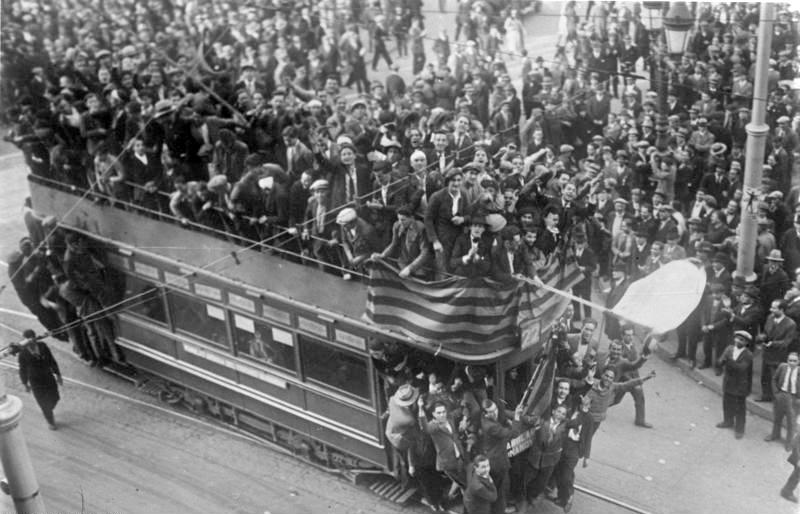|
Francisco Maroto Del Ojo
Francisco Maroto del Ojo (15 March 1906, in Granada – 12 July 1940, in Alicante) was an Andalusian anarchist who was a prominent member of the National Confederation of Labor ( es, Confederación Nacional del Trabajo, CNT). Biography Youth He was born in the Granada neighborhood of Albaicín in 1906. From an early age he dedicated himself to cabinetmaking, taking an active role as leader of the lumber union. After joining the National Confederation of Labor (CNT) he was an organizer of the CNT in the province of Granada, taking part in rallies in places like Granada, Madrid or Motril. Due to his activity he was detained on several occasions. One of his best-known arrests was due to the burning of the newspaper ''Ideal'' —which had supported the attempted coup by Sanjurjo. In 1935 he left the Granadan capital and moved to Alicante. Civil War At the outbreak of the Spanish Civil War in Alicante he founded the Maroto Column, initially composed of 270 anarcho-syndicalist ... [...More Info...] [...Related Items...] OR: [Wikipedia] [Google] [Baidu] |
Granada
Granada (,, DIN 31635, DIN: ; grc, Ἐλιβύργη, Elibýrgē; la, Illiberis or . ) is the capital city of the province of Granada, in the autonomous communities of Spain, autonomous community of Andalusia, Spain. Granada is located at the foot of the Sierra Nevada (Spain), Sierra Nevada mountains, at the confluence of four rivers, the Darro (river), Darro, the Genil, the Monachil (river), Monachil and the Beiro. Ascribed to the Vega de Granada ''comarca'', the city sits at an average elevation of Above mean sea level, above sea level, yet is only one hour by car from the Mediterranean coast, the Costa Tropical. Nearby is the Sierra Nevada Ski Station, where the FIS Alpine World Ski Championships 1996 were held. In the 2021 national census, the population of the city of Granada proper was 227,383, and the population of the entire municipal area was estimated to be 231,775, ranking as the Ranked lists of Spanish municipalities, 20th-largest urban area of Spain. About 3.3% of t ... [...More Info...] [...Related Items...] OR: [Wikipedia] [Google] [Baidu] |
Sanjurjada
Sanjurjada () was a military coup staged in Spain on August 10, 1932. It was aimed at toppling the government but not necessarily at toppling the Republic. Following brief clashes it was easily suppressed in Madrid. Hardly any action was recorded elsewhere except Seville, where local rebel commander general José Sanjurjo took control for some 24 hours but acknowledged defeat when faced with resolute governmental response. Due to his brief success and attention given during following trials, the entire coup has been later named after him. Background Spanish military greeted the advent of the Republic with little enthusiasm, though also with no particular hostility. The officer corps tended to be rather monarchist than republican and rather conservative than liberal, but following last years of the dictatorship, which had compromised and discredited the army, most military men preferred to stay clear of politics. It was only when the new regime was set on a firmly leftward course a ... [...More Info...] [...Related Items...] OR: [Wikipedia] [Google] [Baidu] |
Battle Of Malaga (1937)
A battle is an occurrence of combat in warfare between opposing military units of any number or size. A war usually consists of multiple battles. In general, a battle is a military engagement that is well defined in duration, area, and force commitment. An engagement with only limited commitment between the forces and without decisive results is sometimes called a skirmish. The word "battle" can also be used infrequently to refer to an entire operational campaign, although this usage greatly diverges from its conventional or customary meaning. Generally, the word "battle" is used for such campaigns if referring to a protracted combat encounter in which either one or both of the combatants had the same methods, resources, and strategic objectives throughout the encounter. Some prominent examples of this would be the Battle of the Atlantic, Battle of Britain, and Battle of Stalingrad, all in World War II. Wars and military campaigns are guided by military strategy, wher ... [...More Info...] [...Related Items...] OR: [Wikipedia] [Google] [Baidu] |
.jpg)

